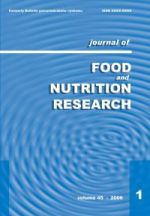Scientific journal
Journal of Food and Nutrition Research
Summary No. 1 / 2007
KOLEK, E. - ŠIMKO, P. - ŠIMON, P. - GATIAL, A.
Confirmation of polymerisation effects of sodium chloride and its additives on acrylamide by infrared spectrometry
Journal of Food and Nutrition Research, 46, 2007, No. 1, s. 39-44
Peter Šimko, VÚP Food Research Institute, Priemyselná 4, P. O. Box 25, SK-824 75 Bratislava, Slovakia. Tel.: 00 421 2 5557 4622, fax: 00 421 2 5557 1417. E-mail: peter.simko@vup.sk
Summary: Acrylamide was applied onto two additives of table salt - potassium ferrocyanide and potassium iodate - and heated in a glass reaction vessel within temperature range 102–180 °C with heating rate of 2 °C.min-1 to study the effect of these inorganic salts on acrylamide elimination. For comparison, the same experiment was carried out also with chemically pure sodium chloride. As found, the amount of acrylamide applied onto chemically pure sodium chloride decreased only by 13%, while the amounts of acrylamide applied onto potassium ferrocyanide and potassium iodate decreased much more considerably - by 61% and 88%, respectively. Comparing infrared spectra of pure acrylamide and the product formed during the experiments, it was found that all the salts under study brought about the polymerization of acrylamide through the formation of C-C backbone polymer while the carbonyl and amino groups remained unchanged. As concluded, potassium ferrocyanide and potassium iodate exhibit a much stronger effect on acrylamide polymerization than pure sodium chloride itself. For this reason, they could strengthen considerably the efficiency of acrylamide elimination in a real food matrix with regard to their presence in table salt, or being added directly to the thermally treated food matrix, respectively.
Keywords: acrylamide; polyacrylamide; sodium chloride; potassium ferrocyanide; potassium iodate; infrared spectroscopy; gas chromatography - mass spectrometry
Download:
(pdf, 163.61 Kb, 4485x)









